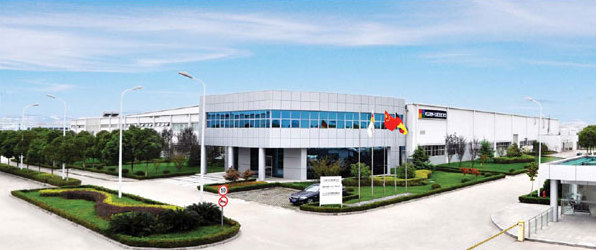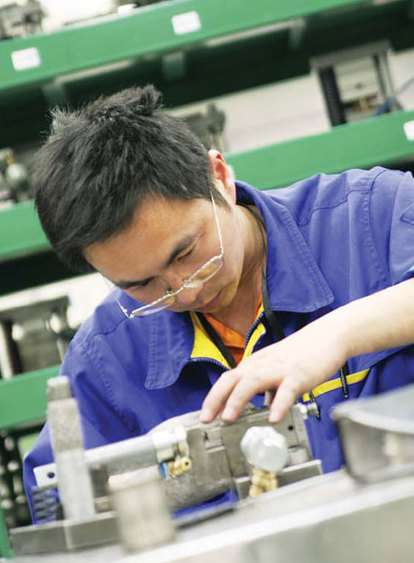German parts spring up and down roots
Updated: 2013-08-16 09:05
By Shi Jing (China Daily)
|
|||||||||||
|
The Kern-Liebers China Group of Companies chose rural Taicang to build its plant because of the city's proximity to Shanghai. Provided to China Daily |
Auto components firm finds taicang close to home in many ways
When Zhang Zhenwei, general manager of the Kern-Liebers China Group of Companies, took up his position 18 years ago, rice paddies surrounded the company's new site.
The manufacturer of springs, stampings and textile machine components, based in the Black Forest of Germany, chose rural Taicang because of its proximity to Shanghai. It is only a 35-minute drive to Hongqiao, the major air and rail hub for the city, much faster than traveling to and within Shanghai.
"Taicang is never noisy or crowded," Zhang says. "It bears a lot of resemblance to German towns, and people feel very safe living here. That's why a lot of Germans have settled down here after three or five years working in Taicang."
This year, construction started on a new Kern-Liebers plant, covering some 5,000 square meters and due to start operation early next year. Investment in the plant will be around 30 million yuan ($4.9 million; 3.7 million euros).
It also plans to increase its workforce by 10 percent to more than 600.
Kern-Liebers China had total sales revenue of 600 million yuan last year, up about 20 percent year-on-year. The Chinese market contributed about 10 percent of the entire group's sales revenue in 2012, up from the 9.5 percent in 2011.
The entire Asia market accounted for about 17 percent of the group's annual sales revenue last year, and that is expected to rise to 30 percent by 2015.
Although China has adjusted its economic growth rate to a more moderate 7 percent this year, it still exceeds that of Germany and most European countries. The country has also become the focus of the global automotive industry.
"The Chinese automotive industry has progressed into a new era when a large number of families are planning to replace the first car which has been used for about 10 years," Zhang says. "They will have higher requirements for their second car in terms of performance and driving experience. It will provide good opportunities for German companies like us, which have long been known for good-quality products."
The Chinese government has also tightened up exhaust emission controls this year with an eye to alleviating the deteriorating air quality in major cities, which again comes as a bonus for German automotive companies such as Kern-Liebers that have been applying much stricter European Union standards.
"We have also done a lot of localization of the automotive parts for the Chinese market," Zhang says.
Kern-Liebers has little concern over the risk of copyright infringement in China. Although it has applied for patents in China, Zhang says it is very difficult to copy its products as it has technical know-how in every part of its products.
There was a time when Kern-Liebers China exported 80 percent of its products to overseas markets, but now it only manufactures for the Asian market, with about 90 percent of its products sold in China.
The company's only problem at present is finding enough qualified people.
As labor costs in China have been continually rising, most companies, including Kern-Liebers, have been replacing manpower with machines rather than moving their plants to Southeast Asian countries such as Vietnam or Indonesia where labor is much cheaper. It therefore needs fewer junior technicians but better ones.
It was a problem Kern-Liebers faced 20 years ago when it first set foot in Taicang.
"Engineers and managers can be transferred to Taicang for three years," Hans-Jochem Steim, who was then president of the group, says. "But it will cost too much to move technicians from Germany to Taicang."
To tackle the shortfall in locally available skills, in 2001 the company joined with Jiangsu Taicang Secondary Vocational School to introduce a dual education system at the school. The training plan was welcomed by Zhou Xinyuan, president of the school, a strong believer in the practice.
"Students can only pick up knowledge when they are put in a real company environment," Zhou says. "Of course, it is great to see all our students booked by German companies long before their graduation."
Kern-Libers had set up its own training center the year before as the company's demand for skilled technicians grew.
Although it usually takes three years to fully train a new employee, Kern-Liebers is generous in its investment of about 5 million yuan a year in training, and last month it opened another training center at its plant so that students can learn better from being put in a real work environment.
Zhang, who was born and grew up in Shanghai, used to commute to Taicang every day in the first 15 years with Kern-Liebers. But he decided to settle down in Taicang three years ago with his family, now that the small city provides all the necessary public facilities.
However, he hopes the local government will introduce more international schools and hospitals over the next five years.
"Taicang also has competitors - neighboring Kunshan and Changshu, and more distant cities such as Wuhan, Hefei and Huai'an, are all thinking of copying Taicang's success," Zhang says. "It is the local government's job to provide a more satisfactory environment in Taicang to retain and attract German companies."
shijing@chinadaily.com.cn
|
Kern-Liebers is facing the problem of finding enough qualified people as well as rising labor costs in China. Provided to China Daily |
(China Daily European Weekly 08/16/2013 page19)
Today's Top News
List of approved GM food clarified
ID checks for express deliveries in Guangdong
Govt to expand elderly care
University asks freshmen to sign suicide disclaimer
Tibet gears up for new climbing season
Media asked to promote Sino-Indian ties
Shots fired at Washington Navy Yard
Minimum growth rate set at 7%
Hot Topics
Lunar probe , China growth forecasts, Emission rules get tougher, China seen through 'colored lens', International board,
Editor's Picks

|

|

|

|

|

|







